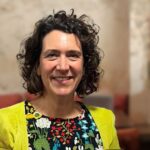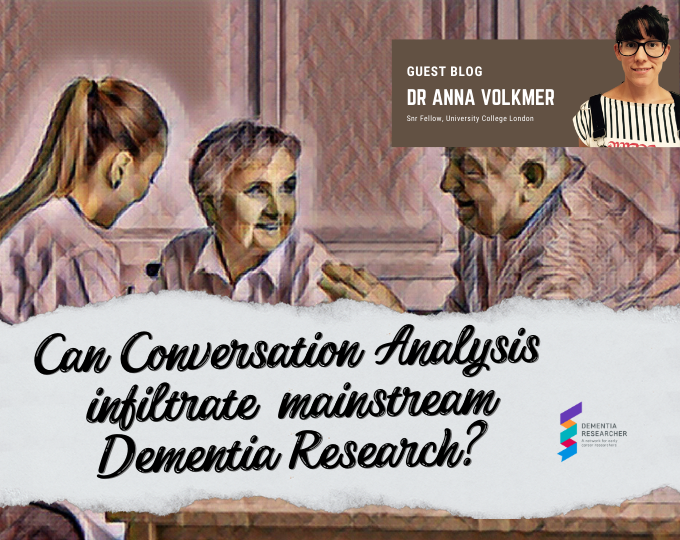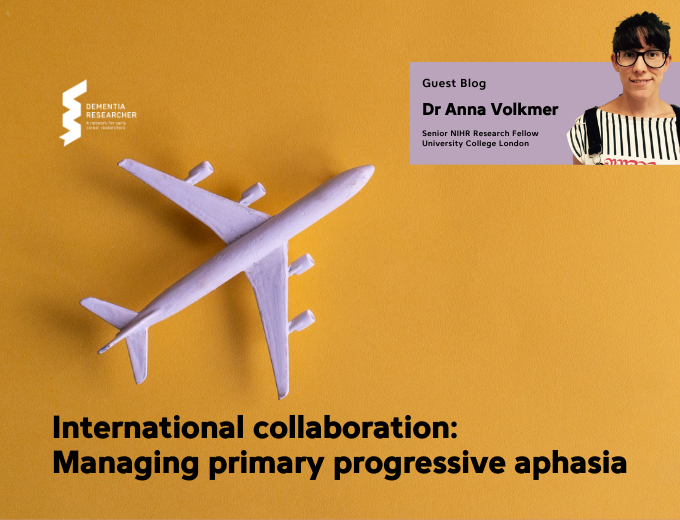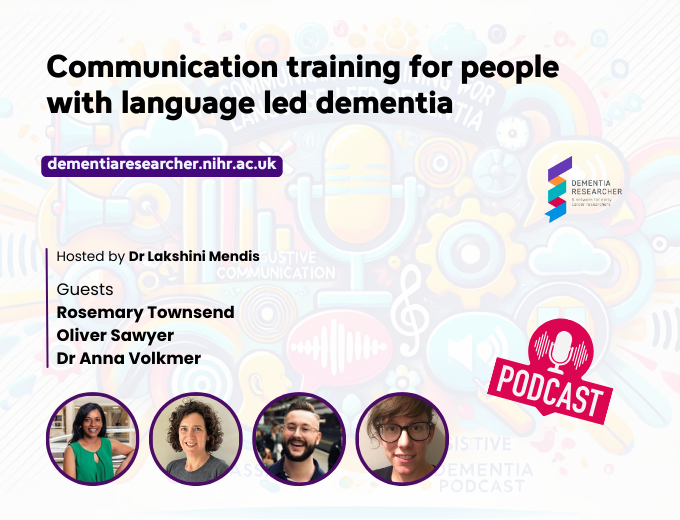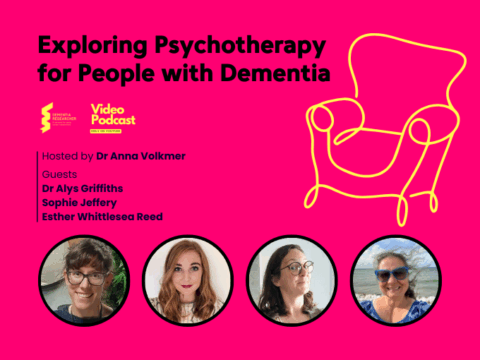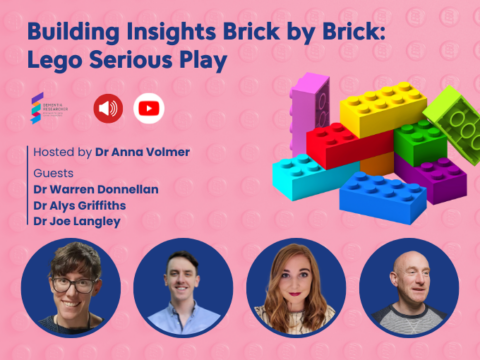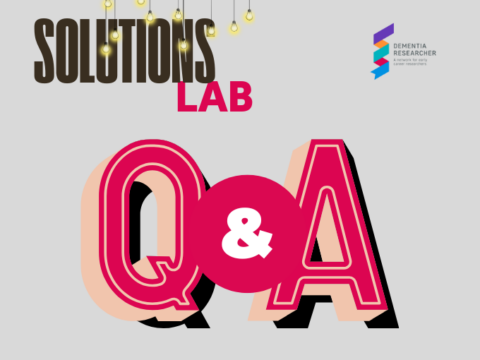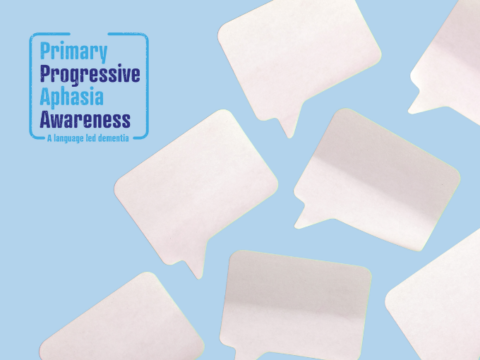In recognition of the first Primary Progressive Aphasia (PPA) Awareness Day, this podcast explores how speech and language therapists are working to support people with PPA to maintain communication and preserve connections with their loved ones.
Dr Shalom Henderson is joined by three leading experts in speech and language therapy—Dr Anna Volkmer, Dr Jackie Kindell, and Rosemary Townsend—who are pioneering innovative interventions to help people living with PPA navigate the challenges of language loss. Together, they discuss the impact of this progressive condition on communication and relationships, and the critical role that speech therapy plays in maintaining meaningful conversations.
Key Topics Discussed:
- Understanding PPA – What is primary progressive aphasia, how does it affect speech and language, and how does it differ from other forms of dementia?
- The Impact on Relationships – How communication difficulties affect personal relationships and contribute to social isolation.
- The Role of Speech & Language Therapy – Exploring tailored interventions, communication partner training, and strategies that help families stay connected.
- Barriers to Accessing Therapy – The challenges people face in getting speech and language therapy, and why more awareness is needed.
- PPA Awareness Day (4th April 2025) – The first international awareness day dedicated to PPA, aiming to improve recognition, research, and support for those affected.
This episode highlights the power of speech therapy in transforming lives, offering practical advice and real-world insights from clinical experts and researchers.
Join the conversation! Mark your calendars for PPA Awareness Day on 4th April and help spread the word about the importance of early intervention and ongoing support.
Voice Over:
The Dementia Researcher Podcast, talking careers, research, conference highlights, and so much more.
Dr Shalom Henderson:
Welcome to the Dementia Researcher Podcast. We're recognising the first Primary Progressive Aphasia Day with speech and language therapists whose research is making incredible progress in enabling people living with the condition to maintain communications in the face of incredible difficulties.
Dr Shalom Henderson:
I'm Dr. Shalom Henderson, and today we're diving into the world of primary progressive aphasia, or PPA, a form of dementia that profoundly affects communication, leaving those affected struggling to find their words, express their thoughts, and maintain the conversations that keep us connected to friends and family. This language-led dementia doesn't just strip away the ability to chat about the day's events, it challenges the very fabric of personal relationships. Our focus today, isn't only on the struggles faced by those with PPA, but also on the innovative interventions that can brighten the landscape of this challenging condition. We will explore how qualitative research has illuminated the painful social isolation that can emerge as conversational abilities diminish, impacting not just those with a condition, but also their partners and families, who often feel equally isolated.
Dr Shalom Henderson:
Key to our discussion will be the role of speech and language therapy, an intervention that goes beyond mere word practise. It's about rekindling the ability to engage in meaningful exchanges, to share opinions, feelings, and everyday experiences. Joining us today, are three remarkable speech and language therapists, who are at the forefront of developing tailored therapies that address these needs. I'm so delighted to introduce Dr. Anna Volkmer.
Dr Anna Volkmer:
Hi.
Dr Shalom Henderson:
Sorry, hi.
Dr Anna Volkmer:
Hi.
Dr Shalom Henderson:
Dr. Jackie Kindell, and Rosemary Townsend. Everyone says hello.
Rosemary Townsend:
Hi, guys.
Dr Jackie Kindell:
Hello.
Dr Shalom Henderson:
And welcome. Before we get into it, let's have some introductions. Anna, can I start with you?
Dr Anna Volkmer:
Yes, of course. I'm Dr. Anna Volkmer. I'm a clinical speech and language therapist, and I've worked with people with primary progressive aphasia for several decades now. I also do research developing interventions, as you mentioned, for people with primary progressive aphasia and their family members. And I work closely with Jackie and Rosemary, we run a UK-wide network for speech and language therapists, and we're part of an international network of speech therapists, with you. And I'm delighted you are hosting this podcast, thank you so much.
Dr Shalom Henderson:
Yeah, thank you. And Rosemary, can you introduce yourself?
Rosemary Townsend:
Yes, I'm Rosemary Townsend. I'm also a clinical speech and language therapist, and I've worked in the field of aphasia for nearly 40 years, went into it very early. But only in the last, probably 15 years, have become interested in PPA, as people with PPA were being referred to me. I've worked most of my career in the third sector, which is quite unusual for a speech and language therapist in the UK. So, I work for an aphasia specialist, an aphasia charity. And that's been wonderful, because it's given me great opportunities to be very responsive to the needs that I'm seeing in the people who come to us, and to be very innovative and create services that meet their needs. So, I'm now, for some years, have been leading the PPA service at Discover, which is a charity I work for, and love being able to connect with people like Anna and Jackie, and the international and national networks. It feels a really collaborative place to be.
Dr Shalom Henderson:
Amazing. Thank you for joining us today. And last but not least, Jackie, can you introduce yourself?
Dr Jackie Kindell:
Yeah, I'm Jackie Kindell. I'm a speech and language therapist. I've spent most of my career working in dementia services, since the early-90s actually. And in that time, I've worked in mainly... Well, before we had memory clinics actually, so quite a while. So, in those days, it was in the community mental health team, and then memory clinics have latterly developed. So, working as part of a multidisciplinary team, actually. Often, I was the only speech and language therapist in the team. I'd work with community psychiatric nurses, psychiatrists, OTs, physio, and we would work with people with all different kind of conditions that would present to our service. And within that, we'd see a number of people with primary progressive aphasia. And over the years, more and more people have come through, as that awareness has increased, which is great. And then just recently, I've moved from the NHS into the university sector. So, I'm a senior clinical lecturer at the University of Manchester, so we teach the speech and language therapists, including about PPA. So that's me.
Dr Shalom Henderson:
Thank you so much, Jackie. I feel pretty small here, because I'm very impressed by all of your years of experience and expertise. For our listeners, I'm also a speech language pathologist, that's what we call it in the US, but it's equivalent to speech language therapists in the UK and elsewhere. I actually just finished my PhD at Cambridge, and I moved back to Boston. And I've been working with patients with primary progressive aphasia for the last seven years, so I'm really looking forward to this podcast and the questions that we'll get to discuss today.
Dr Shalom Henderson:
Anna, if I can come to you first, for our listeners who might not be familiar with PPA, can you tell us what PPA is and how it affects speech, language, and communication?
Dr Anna Volkmer:
Yes, of course. I mean, you described it beautifully really, in the introduction. It's a language-led dementia. So primary means it's the first symptom. Aphasia means language difficulties. And progressive means getting worse. So primary progressive aphasia describes a group of three mainly. We talk about there being three, but of course, three variants. But of course, human beings aren't square pegs that fit into square holes, so we often see people who are a bit more mixed in the way they present. But basically, what we see is that there are some people who present with difficulties using word meanings and understanding word meanings, and we call that a semantic PPA, or semantic dementia. And that's associated with a frontotemporal dementia, underlying frontotemporal dementia neuropathology. Now there's also non-fluent variant primary progressive aphasia, which basically means people present with difficulties articulating. So, we call that dyspraxia, so they have problems, often groping, using the muscles, getting to make them do the right thing. So, speech can be distorted, pitch and tone can be distorted, and those people often have difficulties with grammar.
Dr Anna Volkmer:
So often, they find it hard to form complex sentences and understand complex sentences, and that's also associated with frontotemporal pathology. And then finally, we have a third type, which is called logopenic variant primary progressive aphasia, which basically means people have problems with word retrieval because of a verbal memory disorder. And that type of PPA is associated with an underlying Alzheimer's pathology. Now, as I said, lots of people are a bit more mixed and don't present exactly with what I've described, and what's really, really important actually, as well, is not only that there's these primary progressive aphasias, which probably only describe a small... So, we consider this a rarer dementia, so this is a smaller proportion of the wider population of people with dementia. But actually, what we know is that of the people with all different types of dementia, progressive aphasia is a very common secondary or third symptom.
Dr Anna Volkmer:
So, everything we are describing today, about primary progressive aphasia, is highly relevant to people with all different types of dementia, who will often have an aphasia as a second difficulty, so a language impairment, or just communication difficulties. And communication difficulties, we found, are probably the way that most people with dementia interpret memory, executive difficulties, attention difficulties. So actually, what we are describing today has a really wide importance for the entire population of people living with dementia.
Dr Shalom Henderson:
Thank you so much, that was such a clear introduction to PPA. And I'd like to touch on something that you just mentioned, and some of our listeners may know that language symptoms are often adjunctive in other dementias like you mentioned, like Alzheimer's disease, even Parkinson-plus disorders, like progressive supranuclear palsy and corticobasal syndrome. So, can you tell us a bit more about how the language difficulties, as well as cognitive difficulties in PPA, are those the same in other dementias, or similar, or how might they differ?
Dr Anna Volkmer:
That's a really good question. But what we tend to find from the research evidence, is that people with Alzheimer's pathology, so whether they have a typical memory-led Alzheimer's or another rare type, like posterior cortical atrophy, they often experience logopenic-like symptoms. So, they experience language difficulties that look a lot like logopenic variant PPA.
Dr Anna Volkmer:
Now, people with typical frontotemporal dementia, so that's a behaviour-led dementia usually, I've met people with frontotemporal dementia who can often present with semantic or non-fluent symptoms, however the literature suggests they're more likely to present with a non-fluent syndrome. Then we have, as you mentioned, there's people with Lewy body dementia, there's PSP, there's corticobasal syndrome, and these are overlapping pathologies. We often find people with corticobasal syndrome and PSP overlap more with the frontotemporal dementias, so with non-fluent and semantic. But that's not to say that's a perfect fit. In fact, Jackie in particular, having worked in memory clinics, or pre-memory clinics for many years, you could probably add to this really, because actually, these terminologies have only really been accepted in international consensus very recently. Is that fair, Jackie? I think before that-
Dr Jackie Kindell:
Yeah. And I think just listening to you, it's kind of like there's just so many different terms, aren't there? I think it's a field full of terminology that's really difficult to get your head around, isn't it? And how must that be if you're somebody living with it, or a family member, and you are trying to Google stuff and find stuff. And just in my career, semantic dementia for example, has been called all different things along the way, but it also might be called semantic variant of primary progressive aphasia, it might be called semantic dementia.
Dr Jackie Kindell:
Now they could sound like two different conditions, couldn't they? And I've been in support groups where people have genuinely thought that their husbands have had two different conditions because of the labelling. So, it is quite a difficult area to understand, I think, because of all those kind terminologies. I guess as speech and language therapists, you could spend ages worrying about that. But I guess at the end of the day, we work with a person and their symptoms. And I guess, just lastly, it's worth saying not everybody has been through a sort of really sharp diagnostic service. So sometimes we get people with, they might have atypical Alzheimer's, but as speech therapists, we think they've got primary progressive aphasia, but they've been told they've got atypical Alzheimer's. So, there's all of that, I think, in the mix as well, so it is not the easiest area to negotiate really, I think.
Dr Shalom Henderson:
No, absolutely. And I agree completely. My PhD work was actually in agreement with what you both are saying. I think the nosology is sometimes helpful for patients and families, but there are limitations in that. And like you both said, you can't fit a patient into a box, sometimes their presentations might span one or two variants. So, I agree with you both completely.
Dr Shalom Henderson:
I'm going to move on to our next question, and maybe Rosemary, you can answer this first. Can you tell us a bit more about why and how relationships are affected if people have PPA and communication difficulties?
Rosemary Townsend:
Yes. I mean, in your introduction as well, you said, I think, it challenges the very fabric of relationships, and I'd absolutely agree with that. And we've already been talking, haven't we, about the struggle that people have even arriving at a diagnosis. There's so much uncertainty. It's often a very long process. People are encountering these progressive losses, which I think impact people's sense of competence. Often, we're talking with PPA, often it's affecting people in midlife, so people are probably still at work. And to encounter something which threatens that is terrifying, I think. And it puts a big strain on a relationship, any relationships that that person has, whether we're talking even about work relationships, as well as some personal relationships, partners, and families.
Rosemary Townsend:
And I often say to people, "Communication is the glue of relationships. It's what holds us together." A lot of our relationships, a lot of our conversations are not just transactional, they're relational. We're building and bonding and maintaining friendships and relationships, and when that is derailed by a condition like this, there's obviously an impact. And I think also when people, Jackie's been, and Anna has been talking about this sort of minefield of terminology. And when the word dementia kind of crops up in this, it's a word that carries so much stigma and shame, that can absolutely undermine people's sense of identity in a very catastrophic way. So yes, I think there's so many ways in which it derails and impacts relationships that kind of lead up to the diagnosis. But also, of course, when one has a communication difficulty and you're trying to manage the impact of that, you want to talk about it, you want to share it with your partner, you want to discuss it. And if that's difficult in itself, then it adds an extra layer of complexity.
Dr Shalom Henderson:
Yeah, thank you. Jackie, I've seen you nodding in agreement this whole time.
Dr Jackie Kindell:
Yeah, I think it's right, isn't it? I think there's something very unique about communicate, conversation in particular, interaction, isn't it? Because we do it together, don't we? It's co-produced, isn't it? So, in many conditions, you'll have symptoms, but this is a symptom that it affects that whole co-production of interaction, doesn't it? So, it doesn't just affect you, it affects the people that you are talking to, doesn't it? So actually, in that kind of sense, communication is quite unique, because we kind of create it with other people, and so it instantly affects other people because of that creation. So immediately, we're talking about communication. We're not just talking about the person; we're talking about all the people that they interact with. And obviously, some people they might interact more with, because it's your partner or your daughter. I've had people and it's their mother or father; they've got elderly parents. And so, all of these things, I think it's that impact in your everyday life, isn't it?
Dr Jackie Kindell:
And I guess, we talk about word finding difficulties on tests, don't we, or not being able to do certain things in test situations. But when you kind of go into real life, and people's everyday life, and you listen to them talking about the difficulties they have. And Rosemary's exactly right, because it's also the emotional impact of those difficulties, isn't there? Because you'll feel frustrated, or you might feel embarrassed by your difficulties. And sometimes people get really kind of fearful of going into situations because they're worried about what's going to happen in that situation if they've got a word finding difficulty. Or even a situation they don't necessarily need to talk much, you know, going into shops, and you'll say, "Well, do you really need to speak in the shop? You could just pick up what you want." But even in case I might need to talk, I might not want to go to the supermarket with my wife in case somebody asks me a question. So, the ramifications emotionally, I think, thread through it as much as well.
Dr Anna Volkmer:
I really liked that piece of research that another speech therapist, actually a speech pathologist in Melbourne, Australia did around relationships, spousal. It was a researcher called Margaret Posebon, who the four of us all know. And she wrote this great paper, and the title of the paper is about spousal experiences, was It was a Terrible, Terrible Journey. And I think that title really sums it up. And the paper goes into the loneliness and isolation that both of the people in that partnership experience, and the increasingly narrow world.
Dr Anna Volkmer:
I vividly remember, Jackie, you are talking about that, like a decade and a half ago, at a talk I went to, and you talked about people's world shrinking. And I think it's so important to understand that, because it's not just for the person, it's for the people around them too.
Dr Jackie Kindell:
And I think that's important, isn't it, because that kind of happens in all different kinds. People say things like, "You kind of find out who your friends are," because friendships become more difficult, don't they? And do people stick around when it's hard to do? So yeah, I think all of those things are really important.
Dr Jackie Kindell:
And then also I think the spouses worry. I mean, I think I've lost track of the number of times people have asked me, "Should I give him the word when he's struggling? I know the word, but I don't know whether to say it. But then if I say it, will it affect him saying it next time?" And they get into knots and knots of what's the right thing to do, and there's so much so that they're overthinking it because they want to know what the right thing is. And that becomes emotionally, really quite fatiguing for family members. That worry, not just about now, but if I do this now, what will I do in the future? Because it's a constantly changing distance as well, isn't it? It's obvious in this progressive sense, but I think we have to stop and think about that, don't we? Because people are incrementally changing, so once you might feel you've got on top of it, but then there's other changes. So, it's different, for example, than say, stroke, what we might work with people, that's different kind of flavour to it completely.
Rosemary Townsend:
I think you're absolutely right. I think this sense of a shrinking world but also being marginalised when you're in a group situation, even if it's a family group situation, people often talk about being kind of on the margins, looking in, not really participating. And family members want their family member to be there, but they don't know how to include them. And sometimes, you know how noisy a family gathering can be, people want to be there, they feel they need to be there, and yet they find the whole thing really overwhelming. So yeah, relationships of all sorts, I think, are really fundamentally impacted.
Dr Shalom Henderson:
Yeah. Anna, I know that you have some interesting research on this topic. So, I wanted to ask, what does your research tell us about what people want in terms of relationships and communication?
Dr Anna Volkmer:
Thank you for mentioning that [inaudible 00:22:07], because I think we've touched on it already, to a certain extent. And I think there's been research, as we've done small types of studies in the UK, qualitative focus groups, saying, "What do you want speech therapists to do for you," And we've asked people with PPA and their family members. And that first piece of work we did in that field, it was actually done by an MSC student at UCL. I supervised her, and we... Basically, family members and the patients were saying, "Well, we don't really know what speech therapists do. It's like going into a sweet shop or a chocolate shop," I think the phrase was, "With the blindfold on. We don't really know what you offer." So, we changed tack a little bit in the way we did this research. And I've published the first paper that reported the results a couple of months ago, and there's a second paper coming out shortly.
Dr Anna Volkmer:
But basically, what we did, was we went international, and we started asking people with PPA, and their family members, not what can speech therapy do for you, but what do you want to change about your communication and the way PPA affects your lives? So, we changed the way we looked at the question, and we used a different methodology, we used consensus methods. And we asked speech and language therapists and pathologists across seventeen countries internationally, so we captured groups in every continent in the world except Africa. So, we had over one hundred people with PPA, so just under one hundred people with PPA, and just over one hundred family members. And we use these consensus methods to vote up what people wanted. And essentially, the main thing that people want is to maintain conversations with people they love, with family members and friends. That's what they want to maintain in their lives.
Dr Anna Volkmer:
And I think that in general, speech and language therapy research in the past, has presumed that people wanted to work on single words. But I think the emphasis that we've given, in terms of the relationship and how we've just talked about that already in this podcast, but also this evidence coming from people themselves, shows actually we cannot overlook relationships. We cannot overlook conversation and interaction, because although people are wanting to work on getting words out, what we found was it was getting words out wasn't necessarily in the context of just being able to say a list of ten words, it's all about these interactions. We are now in the process of looking at it, at that data, in terms of country by country, to see if there are any different priorities across different countries. But news flash, like secret results, we're not seeing big variations actually. What we are seeing is this common thread, these common values across people living with this disease.
Dr Shalom Henderson:
This is really exciting work, and I'm very excited for the second study to be out as well, so that everyone can read about it. So just to summarise, I think that what you're saying, and from my practise as well, a lot of stroke patients, for instance, speech therapy referral is so instant, it's kind of commonplace for them to see a speech therapist. But people with PPA and other types of dementia, who might have an aphasia as well, they're not really referred frequently to speech therapy services, so there is a paucity of that. And the focus is more on some of the maybe stroke aphasia work, fix it, restorative, word finding. And actually, what the families want is to maintain communication with their loved ones.
Dr Anna Volkmer:
I'm glad you mentioned that because that is what's driven us to organise. You mentioned it in the introduction, and we're going to talk about it again, I know, I'm kind of dropping it in now, is we are organising the first international Primary Progressive Aphasia Awareness Day. Because that's exactly what people tell us, they tell us that they don't realise speech therapy is the main treatment for these diseases. They have no idea, and they often stumble across this information.
Dr Anna Volkmer:
That doesn't happen to everyone, but for many people, there is an absolute lack of awareness of PPA, and then even more of a lack of awareness that speech therapy can help. And I think that's a really key reason that we need to get that message out. It's almost the main message that we're trying to communicate, because in a way, that's been some of the second work that's come out of that research I mentioned, which was... So first of all, we wanted to know what people wanted to work on, or what was important, and then I've been looking at care pathways as well. The care pathway is if you have PPA, get a speech therapist.
Dr Shalom Henderson:
I wish there would be a way to just announce that globally, this is people with PPA [inaudible 00:27:20]. And correct me if I'm wrong, but we need speech therapists from Africa to join the network?
Dr Anna Volkmer:
Absolutely. That would be wonderful. We really haven't. And that's not for want of trying, I've kind of explored it, but yes, it would be really great to have some more speech therapists from Africa. We know that low-income countries, such as Africa and India, we have representation from India, but they're the countries where there's biggest increases in older adults and people with dementia. So, we do need to share, we want to share what we are learning with people across all these countries.
Dr Shalom Henderson:
Yes. So, if there are any speech language therapists listening to this podcast, please contact Anna, Rosemary, or Jackie. Rosemary, I'd like to move on to the next question, which is on... Can you talk about what sort of work you might do in a therapy setting with people living with PPA, and how that can help?
Rosemary Townsend:
Well, as Anna's just said, there's so much research happening at the minute, and it's really exciting that the research and the clinical work are very closely linked. And it's great as a clinician, to be able to draw on that and incorporate it, and let it sort of guide my therapy at Discover.
Rosemary Townsend:
As Anna said, the sort of universal and fundamental desire of people living with PPA is to maintain conversations with their loved ones. And so, at Discover, I adopt that compensatory approach. I tend to use communication partner training a lot in my work. And so, I'll see people with the diagnosis, along with their care partner, or sometimes whole family groups. People who don't have a care partner, often they'll come with a friend, or something like that, or I do see people on their own. But most often I'm helping people to develop practical tactics to manage their everyday conversation better, and to overcome the barriers that exist. Very not rocket science, easy to understand, but things which involve behaviour change. When you're looking at changing behaviour, it needs to be something that people not only understand, but also have the opportunity to implement, practise, look at themselves on video, and go out into the real world and try as well, and share with their families.
Rosemary Townsend:
And I also think one of the things that came out of another piece of international research looking at best practise principles, was the importance of knowing people deeply. Because this is a really complex condition, it's not only different for everybody, but also, it's overlaid on people who have had different lives, different relationships, different communication. And so, for me, I'd say that's another really important point, is spending time really getting to know what it is that people bring to the situation. Not only the problem, but the resources they have, how they would've approached previous life difficulties, other co-morbidities they may have. And getting to know them, so that into preparation for the fact that we're going to be involved with them for quite some time as well. Because another feature of the service I'm able to offer at Discover, is that it's long-term, there's a lot of continuity. That's another kind of key point of the way I'm supporting people, is to make sure that over time, they can re-refer for reviews and troubleshooting as things change, because it's a dynamic situation.
Rosemary Townsend:
And a couple of other things, people often arrive with very little information, I find, after diagnosis, as it's been this long lead up, lots of uncertainty. Then they might just have the name of a condition, which they can't even pronounce, and they don't understand. So, I think a lot of our role is to explain, and to explain how it's affecting them in very practical terms, and what they can do, so to inject a bit of hope. Hope is another sort of key point.
Rosemary Townsend:
And finally, the other thing which I'm able to do, and I find people value a great deal, is connecting them with others who are in a similar position. Because we've talked about the isolation, if you start to look for help in the more general dementia support field, you might find people who present very differently, because they don't have a language-led dementia. They might have a memory-led dementia, they might be a lot older as well. And so, I like to match people quite carefully and closely, to give people a sense of, well, common ground, and reduce their sense of isolation, for both them and their family member.
Dr Shalom Henderson:
That was really beautiful, Rosemary. And on your last point, it really resonates with me about connecting people, having a sense of community. I was very fortunate to attend a couple of sessions with, or the support groups with the rare dementia support near Cambridgeshire. And it was just so wonderful to see families come together, and they might not understand their condition. The patient might say, "Why do I have semantic variant? TDP-43, what is that? Do I have a different diagnosis?" But at least they come in, and they meet other people and families who share similar diagnoses or different challenges. And it's just, I think, so wonderful to get closely matched families together, and that's really important work.
Dr Anna Volkmer:
Definitely. People learn so much from one another. I confess, I've learned so much from families, but also from other therapists, from Rosemary and Jackie. Rosemary and I first started talking, oh, in 2011, when I first started writing a book about speech therapy and PPA. But actually, even back then, as I was writing and first starting to get into research, I remember reading some of Jackie's research, which I have a vivid memory of reading one of Jackie's papers, which is about a couple where one... And I've heard Jackie talk about this, and I want her to talk about it now, where there was a couple, and Jackie used music, life history, and it's so vivid to me, the video you showed of that, Jackie, in one of your talks, and how that working with the couple to meet different means of interaction, that it could bring them closer together. And what was this, wasn't it Lady in Red that the song-
Dr Jackie Kindell:
Yeah, those singing. Yeah. I think it's interesting, isn't it, because I think when Rosemary was talking, and before, we talked about our role, I think one of the problems is that people have assumptions about what speech and language therapists do, don't they? They think we practise stuff; we help people get better. And so, it becomes problematic, doesn't it, when people haven't got a condition that's going to get better, or then they can't practise stuff because they may not necessarily have the insight required to practise in some instances. And in sometimes they do, and they will over-practise, won't they? It's a real... It's fast, isn't it? But that lady didn't really have an awful lot of insight into her... She had semantic dementia; she didn't have enough insight. She knew there was something wrong, but not something deeper than that. And she was talking less and less and less. And actually, she did have a life story book, but it was kind of like tumbleweed. When you got it out, it didn't encourage any communication.
Dr Jackie Kindell:
And so, we made a family, it was a DVD actually, in those days, a DVD of all her favourite songs. But actually, one of the things we did was we videotaped them singing together. Because again, I think people lump all the dementias together, don't they? So, people always say, "Well, you can listen to music, and you can reminisce about time's gone by." This lady couldn't reminisce about the Lady in Red, for example. And it was very touching. There was a song that was her engagement song, and if she said, "That was your engagement song," she'd go, "Was it?" But actually, every time we videoed her with this song, there was one bit where it said, "My arms reach out to you with love," or something like that it said, and every single time she went and touched his hand and he touched hers, and they looked together.
Dr Jackie Kindell:
So actually, in the moment, there was this really strong connection between them. So, it's not just about reminiscence, sometimes it's really things that you can do in the moment that really help people connect. And yes, that moment might be gone, and it might mean that you're not necessarily hoping things would change in two days or seven days or fifteen, but that moment can mean a real huge amount to that family carer. And to that husband, it really meant something, that he really connected with her, and it was kind of like helped him carry on through other difficulties in the day. So, when often we talk to carers and family members, it's quite surprising they're not unrealistic, they don't ask for much often, and they really value really small things. So, they're not expecting us to wave a magic wand, by and large, they're really appreciative of really small things that can help people make a connection, express something together, or do some things that they used to do, because that's what family conversation is, isn't it?
Dr Jackie Kindell:
It's about things like joy, love, and fun. So, finding a way that you could have fun together, when you haven't been, something that might make help you laugh as a family could be actually really crucial, couldn't it, of helping you carry on with what's sometimes a really quite challenging conditions to live with really. So, I think for me, it's about that kind of family adaptation as well, helping people adapt their lives around it, not just in the things we do. And sometimes people go away, and they say, "I was thinking, I've started using music a lot more." Or if you get photos, they go, "Well, we've got these photos." And sometimes it's like the ripple effects, they go away and try other things, and it gives them some problem solving around thinking about something differently, because you've kind of helped them understand something, and helped them understand the importance of what might be quite small things on the surface, but actually quite big things in the context of a relationship.
Dr Shalom Henderson:
That's really lovely, thank you so much for sharing that, Jackie. And I think just to link it with what Rosemary said earlier about really getting to know the patient and the families, I think as a speech language therapist, it's a privilege that I get to know the patients and families outside of the clinic setting, because clinic, usually time is so limited. You have a few minutes to check in, ask some basic questions, and do a quick cognitive test. But what I really loved about my PhD was that I could do home visits. So, I could talk to the caregivers, the families, the grandchildren, and see what that dynamic is like, and actually realise what the patient wants more is to be able to communicate in certain ways or with their loved ones. So, what you've been saying really, really resonates with me.
Dr Shalom Henderson:
I'm just mindful of time, so I want to move on to the next topic of evidence. I think just being in research, and science in general, we often talk about evidence. And even as speech language pathologists and therapists, we often talk about evidence-based practise to inform our decisions on patient care. And I think it's usually coupled with the client, or the patient perspectives, our own clinical expertise, but also on evidence. Is there evidence that shows it's effective? So, I'll ask Anna this question first, do you have any evidence that some of the interventions that are applied in speech language therapy work? And I think you've touched upon this.
Dr Anna Volkmer:
I have. And actually, the example that Jackie gave was described in a conversation. The study that Jackie did used conversation analysis to evidence the impact of the music intervention for that dyad, and that it was those kind of articles and that kind of research. So, conversation analysis research, which has shown how effective people can be in interactions. So, there was another study that Jackie did showing how a person with a different type of PPA could use enactment to communicate whole host of things whilst not necessarily having the verbal means, that inspired us to develop. That partially, and then also some evidence from stroke aphasia, around what we call communication partner training, inspired us to develop an intervention called better conversations with primary progressive aphasia. So, this is an intervention that we try to develop to be implementable in a National Health Service setting.
Dr Anna Volkmer:
As you mentioned, Shaz, sometimes in the National Health Service, in any country, you have about five minutes. What we found was that on average, speech therapists in the UK had about four sessions available to deliver therapy. So, we developed an intervention that was a protocol for a communication partner training intervention, that does a lot of the things that Jackie and Rosemary had mentioned. So, it's based in compensation analysis theory and behaviour change theory. We make video recordings of couples having conversations, and we teach them about how interaction works. We show them clips of their interventions. We support them to identify goals of things they want to do more of, in terms of helping conversation, or interaction flow a bit more, or work out what they want to do less of, so what things have they seen in the video that they feel are barriers to their interactions. And then we helped them practise that.
Dr Anna Volkmer:
And we did an NHS-based, so National Health Service based randomised control trial of that pilot study across several different NHS trusts in England and Wales. And we found that the outcomes really positive, so people change behaviours, both people with PPA and their partner's behaviours changed in the right direction. People felt they'd achieved all their goals. They rated their goals as overachieved or achieved, and their confidence increased. We are now in the second stage of that programme of work. We are just actually about to start in the next couple of weeks, another multi-centre trial, doing the same intervention, but we are extending it to include people with other types of dementia. So, we're actually seeing if we can deliver it remotely as well, because one of the barriers to receiving that intervention was that lots of people had partners. So, as Jackie mentioned, adult children who weren't always able to be in the clinic with the person. So, we're including lots more remote, more of a remote therapy focus as well on that study.
Dr Anna Volkmer:
And we are also looking at confidence and then relationships. So, we're looking at closeness to see if the intervention impacts on closeness as well. So, I would say that there is lots of research evidence, and the better conversations randomised controlled trial was probably, I think it was maybe the first published randomised controlled trial of speech therapy for PPA, or that may be first or second, jointly with another study over in the States. But there's only two published studies that are randomised controlled trials of any speech and language intervention for PPA. So, it's quite difficult to deliver a complex intervention in a randomised controlled trial, so we felt quite pleased that we'd managed to do that, and it was showing the things that we'd anticipated it would show. But this is really the beginning of the story, we need more evidence to influence speech therapy, to influence more funding for speech therapy, and to help people get more access to evidence-based speech therapy.
Dr Shalom Henderson:
So, I guess, on that point of access, Jackie, how do people get to speech language therapy if they need it?
Dr Jackie Kindell:
It's a complicated system, isn't it? I think that's part of the issue as well, because if you have certain conditions, there's a multidisciplinary team, and it's quite clear who's in that team. The difficulty, I think, with PPA slightly, is that services are commissioned differently. So, in some areas, there's a speech and language therapist that's a dedicated speech and language therapist, that works with the dementia services, and they often have a particular interest in PPA. In other areas, that's not being commissioned, or in some areas it's quite convoluted in terms of the commissioning. But what I always say to people is if you're in a service, you might be in a memory clinic service, they might be able to refer you directly. So, if you could ask them, "Is a speech and language therapists," they may refer you directly. The consultant that's given your diagnosis, hopefully, if you've got a diagnosis of primary progressive aphasia, would be able to have that discussion about referring directly to speech and language therapy.
Dr Jackie Kindell:
If that hasn't happened at the time, and if you found yourself in a bit of a vacuum later on, then you can go to your GP and ask to be referred. And I think what we need to remember, was we need to help strengthen people's own advocacy, because I think we all feel really strongly about this, why should somebody with primary progressive aphasia have any less right to speech and language therapy than somebody that's had a stroke, a head injury, Parkinson's, motor neurone disease, corticobasal degeneration, vascular dementia, all of these things, I think everybody deserves and has the right to a speech and language therapy assessment and that intervention. So, I think I always kind of try and explain to people, because sometimes people come to you, and they say, "I can't get it in my area." But so, you say, "Well, have you asked? You said that as his wife, you want advice about how to communicate," because the GP might say, "Well, he's in the later stages, so will that be worth it?"
Dr Jackie Kindell:
So yes, obviously, because you need advice about communication, so trying to get across to people that it doesn't really matter necessarily what stage of PPA that you are, it's about different things at different stages. And speech and language therapists can work with PPA at all of the stages. Even people are very, very mild, I've worked with people who've still been working. I worked with a university lecturer with PPA, who was wanting tips on how to lecture to his students, and then people at very advanced stages of the condition. So, I think it's about giving people the confidence, and sometimes being a bit assertive, and saying, "No, this is what we really want, and we'd like you to make a referral, please." So, asking the GP to refer to their local speech and language therapy service, which will generally be an adult service, a hospital, or an outpatient clinic, but they will know because they make lots of referrals anyway.
Dr Shalom Henderson:
And Rosemary, how can patients and families get involved in Discover?
Rosemary Townsend:
Yes. I mean, as I said, we are a third sector organisation. And actually, about 45% of the people referred to our organisation are referred by their own care partner. And they're very much the same profile of person, they're very highly proactive relatives. And I feel very much that you shouldn't have to have a proactive relative in order to get your speech and language therapy. But we have an open referral system. The other referrals come from speech and language therapists, mostly in the NHS, or neurologists who are luckily, thankfully, with a lot of work and encouragement, are seeing the benefits of speech and language therapy, and referring people. But we accept people from all over the country. We offer an online support service, as well as in-person in Surrey.
Dr Shalom Henderson:
I think all of our conversations so far, is getting me really excited about PPA Awareness Day. But before we get to that, Anna, I have one final question for you. Do you have any research on barriers to getting to speech and language therapy, or based on your personal experiences?
Dr Anna Volkmer:
We've touched on lots of those. Jackie has mentioned them, geographical barriers, funding barriers. So, in the UK, we have this phrase that there can be a postcode lottery, meaning that where you live might dictate how much access you have to speech therapy with PPA. So, some areas of the UK, people say that their local speech therapy services are not funded at all, and others, they are funded to see people with PPA, their public services. There is other, Rosemary touched on things like stigma and shame. We also heard a bit about awareness. And I have been doing two discrete pieces of work, well, three really, but looking at the barriers to accessing speech therapy. One is a health economic study, looking at what people value most and where they feel the barriers have been. And another one is a study around barriers for people from ethnically and linguistically diverse communities.
Dr Anna Volkmer:
And I probably should quote one of the participants in that second study, and she said that doesn't matter what culture you are from, having a rare dementia is a bigger problem because nobody is aware of what it is and where to get help. And I think that really underlines actually, that the biggest issue is a lack of awareness of what primary progressive aphasia is, and a lack of awareness that speech therapists can help. And that's not just amongst the public, it's also amongst health professionals. So, lots of health professionals don't know about the breadth of our role, or when we can help. I've had lots of very well-informed colleagues, who I know very well, say, "Oh, but you can't help because it's too late," or it's too early. And actually, we can help through the entire journey. And then actually, there's also for some speech therapists who may lack awareness of the range of therapy options available. So, there are several barriers around awareness, and we are really striving to target them all.
Dr Anna Volkmer:
I should mention here, we've got a new book coming out, about the role of the speech therapist, a new resource. I hate doing this talk, but I know I should. So, when I first met Rosemary, when I thought about writing this book, the first version of this book in 2011, it was super scary. I've now edited a new one, with lots of amazing contributors. So, this time I feel much better, because it's not me. And Rosemary has contributed to one of the... Co-wrote a beautiful chapter on communication partner training. And we do these things to try and promote awareness at all different levels, so that we've got resources for speech therapists, research for speech therapists. We have a network for speech therapists. We try and do research for other health professionals. We try and talk. We have the rare dementia PPA support group to try and raise awareness amongst people with PPA and their family members, and lots of health professionals go to that. And we do education across health care professionals.
Dr Anna Volkmer:
So that's really what this awareness day boils down to, is we want to increase awareness in response to what we clinically know, and that there is evidence for, a lack of awareness.
Dr Shalom Henderson:
This is very exciting, Anna. When can we expect this book to be released?
Dr Anna Volkmer:
Well, let me just show you one I made earlier. Ta-da. So, we're going to be having an official launch in February, and I can send the information to put it on the NIHR Dementia Researcher website. But this is a new book that is out. So, this is a hot-off-the-press copy, so I think you can buy one now, pre-order them now, with a little discount. Very exciting.
Dr Shalom Henderson:
That's what I'll be doing after this podcast. But over to you, Rosemary, to tell us about PPA Awareness Day.
Rosemary Townsend:
Okay, I think we're running out of time, so I should be very brief. First of all, this is my high-tech displaying the logo. Okay, so this is a logo we want people to recognise. Okay, we're going to be using a lot. I'm going to talk about the why, the who, and the what of this PPA Awareness Day. Why we've heard a lot about this, the research and the clinical evidence all points to the fact that there's low awareness and people struggle to find speech and language therapy, which is actually of great benefit to them, and it's the only intervention for this condition. Who, well, Anna and I are leading it, but actually it's a very collaborative, joined up process. We have the Royal College of Speech and Language Therapists on board, that's our professional body in the UK. We have our international and national speech and language therapy networks, rare dementia support, other colleagues.
Rosemary Townsend:
And most importantly, we are putting people living with PPA absolutely front and centre of this whole campaign, because they're the ones who are actually going to present the most authentic and compelling message. They have already collaborated with us by co-designing this logo and given us some advice about what we should include in the content. So, what, we have this Awareness Day on the 4th of April, we're going to have a live online seminar there, which will feature contributions from very esteemed neurologists, other clinicians, interviews with people with PPA, some poetry reading. And so that's the webinar.
Rosemary Townsend:
But in addition to, and people can sign up on Eventbrite, we are sharing that on social media. And also, we have a page on the website. And we're also going to preview all this with 10 weeks of strategic drops every week. So, this podcast, we hope will be one of the things which will be posted on social media and elsewhere in the lead up to the Awareness Day itself. We also have the book launch, which Anna's referred to. We have recorded interviews with people with PPA, talking about their own experience of PPA and speech and language therapy. And we also have a Westminster event. We have an event hosted at Westminster, which we hope will be a really good platform to raise awareness of the condition. So, lots of things to keep us busy in the lead up, and it's going to be starting on the 31st of January.
Dr Shalom Henderson:
This is fantastic. Everyone who is listening, I hope you're excited and definitely watch this face. Thank you so much, Rosemary.
Dr Shalom Henderson:
As we wrap up today's show, it's become clear just how transformative speech and language therapy can be for those living with primary progressive aphasia. Throughout our conversation, one thing stood out, many people aren't aware that speech and language therapy is a crucial intervention for individuals and families with PPA. This therapy isn't just an option, it's the mainstay of managing this challenging condition, providing not just improvements in communication, but also a renewed connection with loved ones. And for those looking to learn more or to get involved, mark your calendars, PPA Awareness Day is on the 4th of April. Again, it's the 4th of April. It's a fantastic opportunity to support and learn more about PPA, and how therapies can make a difference. Thank you once again, to our guests, and to all of you for joining today on the Dementia Researcher Podcast. We hope today's episode inspires you and broadens your understanding of PPA and the impactful role of speech and language therapy. All that is left for me to do is to thank our incredible guests, Rosemary, Jackie, and Anna. I'm Shalom Henderson, and you've been listening to the Dementia Researcher Podcast.
Dr Jackie Kindell:
Bye.
Dr Anna Volkmer:
Thank you, bye-bye.
Rosemary Townsend:
Bye.
Voice Over:
The Dementia Researcher Podcast, talking careers, research, conference highlights, and so much more.
If you would like to share your own experiences or discuss your research in a blog or on a podcast, drop us a line to dementiaresearcher@ucl.ac.uk
Did you know... you can find our podcast in your favourite podcast app on mobile devices, and our narrated blogs are also available as a podcast.
The views and opinions expressed by the host and guests in this podcast represent those of the guests and do not necessarily reflect those of UCL or Dementia Researcher

 Print This Post
Print This Post
